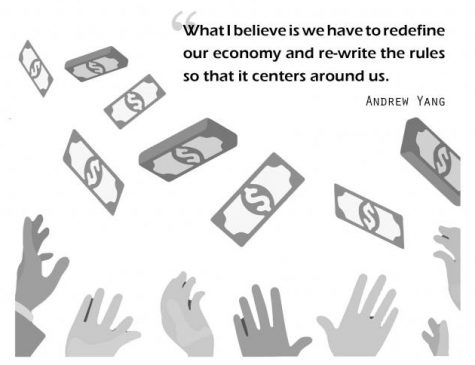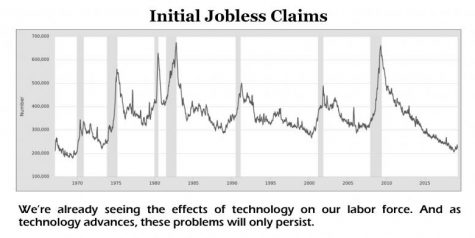The case for UBI: Why you deserve $1000 per month
I’m not a Communist. I just want to clear that up before I get into Universal Basic Income (UBI). The topic has garnered much interest due to 2020 presidential candidate Andrew Yang, who made UBI the basis of his platform. While some write off UBI as “communism” or “free handouts,” the idea is much more democratic and necessary than it seems.
April 18, 2019
What is UBI?

UBI is a social security program that offers each American citizen over the age of 18 1000 dollars per month—no regulations, no restrictions, and no requirements attached. Citizens already receiving government benefits would choose between current benefits and UBI.
Why do we even need UBI?
The automation wave, job losses, and extensive costs facing Americans need to be addressed.
Four million manufacturing workers have already lost their jobs to automation. This trend is only projected to continue; in the next 12 years, one in three working Americans will suffer the same fate.
A 2016 report published by the Obama Administration predicted that 83 percent of jobs paying under 20 dollars per hour will be subject to automation.
The U.S. is starting 100,000 fewer businesses per year than it was 12 years ago.
A 2017 Bankrate survey found that 59 percent of Americans lack the savings to afford an unexpected 500-dollar expense.

UBI is projected to permanently expand the economy by 12.56 to 13.1 percent.
The Roosevelt Institute’s research found that Yang’s UBI would add 2.5 trillion dollars to the economy in eight years. It would also bring 4.5 to 4.7 million more workers into the labor force.
UBI would help U.S. citizens start new businesses, go back to school, and provide for transitional costs as we face the automation wave.
An additional income will only advance the American people. It will …
- Alleviate student loan burden: If you’re going to college, you’re probably going to be in debt. 1000 dollars per month definitely isn’t going to hurt.
- Bring more people into the workforce: When people start working, they often lose unemployment benefits, leaving them worse off than when they started. UBI is just enough to meet basic needs while encouraging workers to find new jobs.
- Help entrepreneurs: UBI would act as a safety net for young entrepreneurs, giving them leeway to build their business.
- Support those in creative/nonprofit workplaces: Those who are most necessary in communities are often undervalued when it comes to compensation, leading them away from essential work in our communities. UBI will help address their needs, allowing them to safely pursue lower-paying careers.
How do we know that UBI actually works?
UBI isn’t a new, drastic idea. It’s been around for awhile, and it’s been supported by great thinkers such as MLK. The following are classified as or resemble UBI programs.
- Alaska has the country’s second lowest income inequality. Following implementation of the Republican-proposed petroleum dividend (amounting to 1000-2000 dollars yearly), poverty was reduced by one-quarter.
- The “Mincome” Experiment in Manitoba, Canada noted a 8.5 percent drop in hospital visits. Domestic violence & mental-illness appointments and treatments decreased.
BIG Pilot Project in Namibia saw heavy reductions in crime and school dropouts rates all while improving health. - GiveDirectly in Kenya gave aid directly to the people and found more girls in school, better nutrition, and an increase in entrepreneurship.
The practicalities behind UBI
1. How would we fund UBI?
UBI would cost 1.3 trillion dollars. However, consolidation of welfare programs along with a Value-Added Tax (VAT) would cover the majority of the cost. Large corporations, such as Apple, typically stow away millions of profit overseas. However, a VAT would ensure that Americans would receive proper tax revenue.
2. Why don’t we just retrain workers who lost their jobs?
We’ve tried. And it just hasn’t worked. Many studies have found that efforts to retrain manufacturing workers have been ineffective. For instance, an analysis by Mathematica Policy Research found that Trade Adjustment Assistance recipients earned less than those who received unemployment benefits; moreover, only 37 percent with specific job training actually got jobs with in that sector.
3. Won’t UBI cause inflation?
Economists say that inflation occurs when there are changes in money supply. Because UBI is mainly funded by a VAT, it is using money that is already in the economy. Although companies may increase prices because of the VAT, competition and technological advancements would keep prices reasonable and balanced. Moreover, the government only recently gave four trillion dollars for bank bailouts and found no inflation.
4. Isn’t UBI communist?
No. UBI does not promote public ownership of property and does not create a classless society.
5. Won’t people become lazy and waste their money?
12,000 dollars a year is not a liveable income; people would still need to work. Most research shows that cash transfer programs only decrease working rates in new mothers and teenagers. Many studies found a rise in high school graduation rates, and some studies even show increases in working rates. A Harvard and MIT study found no increase in alcohol or drug consumption. The idea that the underprivileged would simply waste additional money is a stereotype that is not supported by data.
Still not convinced or want more information? Check out
yang2020.com / The War on Normal People by Andrew Yang